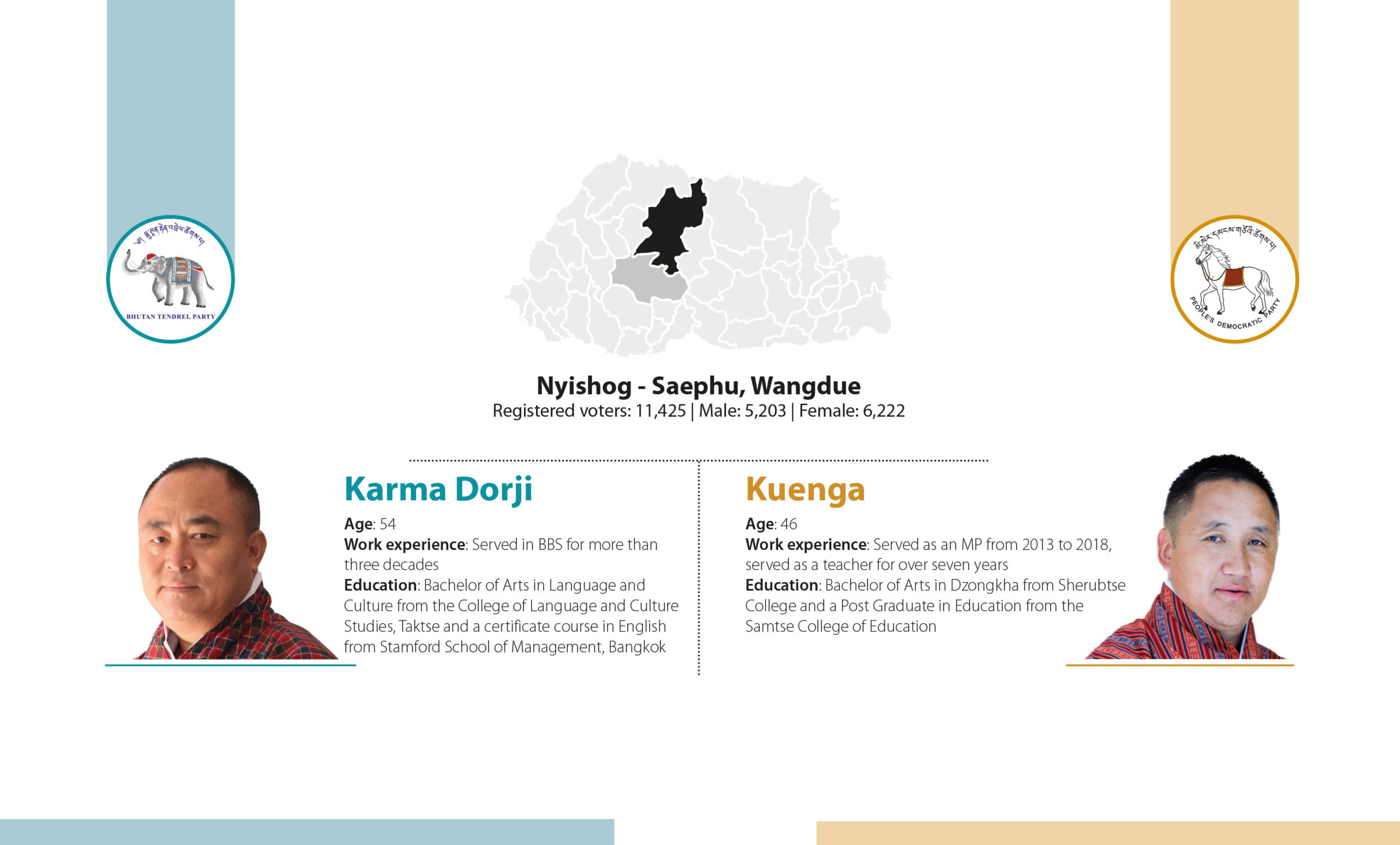Nyishog – Saephu, Wangdue
Registered voters: 11,425 | Male: 5,203 | Female: 6,222
Karma Dorji
Age: 54
Work experience: Served in BBS for more than three decades
Education: Bachelor of Arts in Language and Culture from the College of Language and Culture Studies, Taktse and a certificate course in English from Stamford School of Management, Bangkok
One pledge you appreciate about your opponent.
Firstly, amidst the myriad promises and commitments, one pledge from my opponent resonates – the dedication to public service, encapsulated in the Bhutanese term “mimang zhabto.” It acknowledges a noble intention to help and enhance the lives of the people.
Voters say it does not matter which party comes to power. Comment.
This stereotype of the voters has been one of my worries even before I entered in the political field. The destiny of Bhutan is shaped not only by public service but by a myriad of factors intricately interwoven in the democratic fabric.When confronted with the assertion that the party in power is inconsequential, I vehemently disagree. The political party at the helm determines policy direction, governance, and the overarching vision for the nation. While individual commitment to public service is commendable, the party’s ideology and strategies play a pivotal role in shaping the trajectory of our beloved country.
If you could change one aspect of politics in Bhutan, what would it be?
In contemplating changes to the political landscape, my vision transcends altering the fundamentals of governance. Instead, I aspire to challenge and transform the prevailing stereotype of voters. It is not about dismantling the political structure but about fostering a nuanced understanding of the electorate’s choices.
Who is more important – candidate or party president? Why?
Regarding the dichotomy of candidate versus party president, I firmly assert the importance of candidates. The candidates bring unique perspectives, skills, and a direct connection with the electorates. While party presidents contribute to the broader ideological framework, candidates embody the aspirations and concerns of the people at the grassroots level.
Farmers in the constituency face an acute shortage of irrigation water. How many canals are you going to improve or construct new?
Addressing the pressing issue of irrigation water shortage faced by farmers in the constituency, my commitment translates into concrete action. I propose the construction of two new canals and the improvement of three existing ones. This strategic investment aims to bolster agricultural productivity, uplift the rural economy, and fortify the resilience of our farming communities in the face of water scarcity.
If elected, one thing you would do for your constituency?
Beyond physical development, my vision for constituency betterment extends to both the physical and spiritual realms. Developing the constituency spiritually involves fostering a sense of community, cultural richness, and social well-being. It’s an approach that recognizes the interconnectedness of material progress and the intangible bonds that bind us as a community.
In case you lose, what next?
Contemplating the possibility of electoral defeat is not a concession of failure but a pragmatic acknowledgment. In the event of an unfavourable outcome, my commitment to public service remains unwavering.
Kuenga
Age: 46
Work experience: Served as an MP from 2013 to 2018, served as a teacher for over seven years
Education: Bachelor of Arts in Dzongkha from Sherubtse College and a Post Graduate in Education from the Samtse College of Education
One pledge you appreciate about your opponent.
I appreciate my opponent’s focus on consolidating excess or unused land for redistribution to improve agricultural productivity and promote equitable distribution. This aligns with our commitment to the same goal, recognizing the positive social and economic impacts such actions can have on our community. Their manifesto aligns with our vision for consolidating land for redistribution, particularly on lease.
Voters say it does not matter which party comes to power. Comment
The belief that ‘it doesn’t matter which party comes to power’ often stems from the inundation of campaign messaging. However, it’s crucial for voters to delve deeper, evaluating each party’s history, the capabilities of their candidates, and the promises they make. Political parties need to prioritize policy transparency, accountability, and tangible societal improvements to regain voter trust.
If you could change one aspect of politics in Bhutan, what would it be?
If I had the opportunity to reform one aspect of politics in Bhutan, I would advocate for a more inclusive and participatory decision-making process within the political landscape. Implementing mechanisms that actively engage citizens in policymaking and governance could foster a stronger sense of ownership and representation within our democracy. Additionally, promoting greater civic education and awareness would empower individuals to contribute meaningfully to the nation’s political discourse and decision-making processes.
Who is more important – Candidate or President? Why?
The relationship between a candidate and a president is akin to the gears in a watch—both crucial components working in unison to ensure proper governance. However, above all, it’s the people who are paramount in this equation.
Farmers in the constituency face acute shortage of irrigation water. How many canals are you going to improve or construct new?
Addressing the acute shortage of irrigation water for our farmers is a priority. My focus will be on ongoing projects such as the Phangyul-Baechu irrigation channel and urgently needed maintenance for the Phangyul-Lachu irrigation channel. Additionally, I aim to initiate new projects like the construction of the Gangju and Samtengang irrigation channels to augment existing water resources.
If elected, one thing you would do for your constituency?
If elected, my foremost commitment is to fulfill all pledges within the designated time frame. I recognize the significance of completing the Dangchu Hydro Power Project in our constituency and will work tirelessly to ensure its timely execution.
In case you lose, what next?
Regardless of the election outcome, my dedication to community welfare remains steadfast. I plan to continue my engagement in community services, supporting my party, and maintaining connections with supporters and voters. These efforts contribute positively to our community’s well-being and our political influence for future endeavours.


